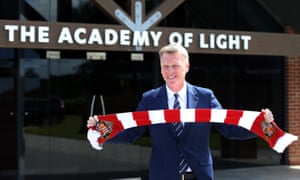 |
| Sunderland start the season after a rollercoaster summer. Photograph: Paul Childs/Reuters |
Guardian writers’ predicted position 16th (NB: this is not necessarily Louise Taylor’s prediction but the average of our writers’ tips)
Last season’s position 17th
Odds to win the league (via Oddschecker) 1,000-1
As Sunderland’s seventh manager in five frequently fraught years, David Moyeshas been quick to condemn this rapid turnover as an “absolutely shocking statistic”. The Moyes mantra is all about stability and “the long haul” but there was a moment during his first full day in charge when he feared the worst.
Sunderland were flying from Newcastle to Geneva en route to a pre-season training camp at Evian in eastern France late last month when their chartered aircraft developed a fault. “It sounded like we were going over a cattle grid in the sky,” said Moyes. “I thought: ‘Here we go.’ As a new manager you want things to be smooth on your first day but this was frightening. I wouldn’t laugh it off. The crew said they’d had to shut one engine down and we needed to make an emergency landing at Manchester. It was scary and it seemed to take ages and ages to get down. My first day in charge and I was looking for my parachute.”
The former Preston, Everton, Manchester United and Real Sociedad manager can only hope the incident does not serve as a portent for his time on Wearside, but readily concedes he is confronting “a monstrous challenge”.
Sam Allardyce, newly departed to coach England, performed a minor miracle in keeping Sunderland in thePremier League last season and Moyes knows he must break the cycle of repeated seat-of-the-pants escapes from the Championship. “Otherwise we will fall off the cliff,” he has said.
A good start would help, with the man dubbed the “Moyes-siah” by Sunderlandfans keen to eradicate the team’s habit of failing to win a league game during August. Registering such a victory in the season’s opening month is something they have neglected to do for the past five years and partly explains why so many managers have come unstuck at the Stadium of Light.
Moyes hopes to use Everton – a club he slowly but surely rebuilt over 11 years – as his template for breathing new life into Sunderland but first he needs to sign some players. And fast. “We need competition for places,” he has warned. “At the moment we don’t have that.” He can only pray that Everton’s concerted pursuit of Lamine Koné – excellent at centre-half since arriving from L’Orient last January – proves forlorn.
The hiatus provoked by the Football Assocation’s slow pursuit of Allardyce created a transfer limbo on Wearside. By the time Moyes was installed Martin Bain, the new chief executive hired from Maccabi Tel Aviv as Margaret Byrne’s successor, was still to preside over his first signing. He has since overseen therecruitment of Papy Djilobodji, a Senegal centre-half, for £8m from Chelsea, where he failed to make an impact before being loaned to Werder Bremen for the second half of last season, but several more faces are required.
At least Bain has been rather more successful when it comes to offloading dead wood, with Steven Fletcher, Ola Toivonen, Adam Matthews, Emmanuel Giaccherini (although many Sunderland fans felt the Italy international should have been given another chance), Wes Brown, Santiago Vergini, Danny Graham and Will Buckley either sold, released or moved on.
Sunderland have bought badly in recent years, signing a bewildering amount of often ineffective players. Allardyce promised to change that narrative and now Moyes, who would ideally prefer to buy British, must take up the baton.
With the midfielder Yann M’Vila – admired by the Scot – and the right-back DeAndre Yedlin having returned to Rubin Kazan and Tottenham respectively following season-long loans, Moyes’s squad is weaker than the Allardyce ensemble which finished narrowly ahead of Newcastle United in the race to avoid relegation.
Tellingly, the latter had been disappointed by the apparent skinniness of his Wearside transfer budget. It made for a certain frostiness and it seemed indicative when the Sunderland statement confirming Allardyce’s departure did not wish the outgoing manager luck with England or thank him for rescuing them last season. Perhaps that omission emphasises just how badly Big Sam’s relationship with Ellis Short, the owner, had deteriorated.
Short has poured tens of million of pounds into the club – often on underachieving players – in the near decade since buying Sunderland. Unfortunately all that this generosity has yielded is a series of balance sheets revealing such heavy losses that Moyes’s spending will need to be fairly circumspect.
So far, so gloomy but, strangely enough, the portents arguably seem rather better for this owner/manager relationship than any other in the Short era. After all the American financier made several forlorn attempts to recruit Moyes before finally getting his man. For his part, Moyes says Short reminds him of Everton’s Bill Kenwright and is confident they can forge a similar bond. Given Sunderland’s magnificently appointed stadium, state of the art training ground and regular 45,000-plus crowds the manager believes the potential is even greater than at Goodison.
The 53-year-old is similarly confident he can debunk the theories harboured by certain predecessors – most notably Gus Poyet – that top players are reluctant to live in this corner of England. Moyes believes the problem of attracting people to Sunderland has nothing to do with geography – and, contrary to much received wisdom, the north-east of England really is a fantastic place to live – but the recent chronic instability of the region’s football clubs.
 |
| David Moyes takes the reins at Sunderland. Photograph: Scott Heppell/AFP/Getty Images |
“People want to come and play for good teams – they want to play for coaches they trust,” he says. “They don’t want clubs to be changing managers every six months. Stable clubs attract better players. If we can achieve stability at Sunderland I’m sure good players will want to come here.”
Allardyce signed three excellent professionals in the anchoring midfielder Jan Kirchoff, Koné and the winger Wahbi Khazri last January and those three promise to be cornerstones of the side once more, provided Koné stays.
So, too, does Jermain Defoe and Moyes can only trust that the former England striker continues defying the advancing years as he keeps dodging defenders. Although Defoe devoted the latter half of last season to proving that he can, contrary to popular opinion, most definitely operate as a lone striker he needs support. Moyes knows the signing of at least one more striker is imperative if Sunderland are to survive let along prosper.
He could also do with Jack Rodwell finally showing some of the promise he displayed when, mentored by Moyes, the young midfielder or centre-half burst into Everton’s first team as a 16-year-old. Sunderland’s manager has challenged Rodwell to “step up to the plate” and promised “to whip Jack harder than any other player, because I know what he’s capable of”. Rodwell’s career has been mainly about woeful underachievement since he arrived from Manchester City for £10m. His reunion with Moyes and its repercussions promise to serve as an intriguing subplot.
If it helps the Scot’s cause that some promising youngsters finally look to be on the point of emerging from Sunderland’s academy – and Moyes is particularly excited by the 17-year-old Swedish attacker Joel Asoro – Sunderland’s senior players are delighted their manager is happy to keep Robbie Stockdale as first-team coach.
The former Middlesbrough defender was plucked from the academy by Allardyce, who believes Stockdale possesses the potential to become “a real star”, and promoted to his present position where the 36-year-old swiftly impressed Defoe and friends. If Stockdale’s career trajectory is firmly in the ascendant, Moyes could be seen as having taken a step down following recent setbacks at Manchester United – where, sacked after 10 months he believes he was treated “unfairly” – and Sociedad.
Although Moyes’s struggles to learn Spanish hardly enhanced his chances in that latter posting, Wearside looks to be very much his natural habitat.
Sunderland has been home to far too many “fire-fighter” managers knee-jerking from one short-term fix to another in recent years but Moyes trusts this will be the season he is allowed to start to build a long-term legacy.
“We need to change from just bobbing along at the bottom of the league,” he says. “We can’t always just buy players just to stay up. We have to bring in players for the longer term who will maybe take six months to make an impact but are right for our journey. I hope I get the time to put my vision in place.”







0 Comments